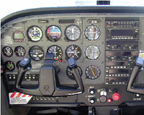|
|
 |
 |
 |
|
 |
Overview
Human performance research is conducted to improve our understanding
of how humans interact, reason, adapt, and respond to different
situations, technology, and environments. Through observation, monitoring,
and analysis, we are better able to predict and enable human performance. Many types of performance are studied such as eye-movement, fatigue,
and cognitive skills such as memory. In this tutorial we will focus
on memory.
|
Memory
In general, humans utilize two types of memory:
Short-term Memory:
To remember things you will only need for a short time, such
as where you parked your car today.
Long-term Memory:
To remember things you will use over and over such as, how to
operate you car. Items in memory are encoded, stored, and retrieved until they
are no longer needed. Memory may be affected by many things such
as noise, distraction, fatigue or even information overload.
 An
airplane cockpit is a complex environment in which it is critical
that a pilot be able to accurately perform many different tasks
concurrently. In a general aviation or private plane, a pilot will learn and
remember all of the instruments and controls on an instrument panel
such as this one. Imagine trying to remember what all the instruments in this airplane
cockpit do! Go to the Research example to see how pilot memory is studied. An
airplane cockpit is a complex environment in which it is critical
that a pilot be able to accurately perform many different tasks
concurrently. In a general aviation or private plane, a pilot will learn and
remember all of the instruments and controls on an instrument panel
such as this one. Imagine trying to remember what all the instruments in this airplane
cockpit do! Go to the Research example to see how pilot memory is studied. |
Research Example |
|
|
 |
|



 An
airplane cockpit is a complex environment in which it is critical
that a pilot be able to accurately perform many different tasks
concurrently. In a general aviation or private plane, a pilot will learn and
remember all of the instruments and controls on an instrument panel
such as this one. Imagine trying to remember what all the instruments in this airplane
cockpit do! Go to the Research example to see how pilot memory is studied.
An
airplane cockpit is a complex environment in which it is critical
that a pilot be able to accurately perform many different tasks
concurrently. In a general aviation or private plane, a pilot will learn and
remember all of the instruments and controls on an instrument panel
such as this one. Imagine trying to remember what all the instruments in this airplane
cockpit do! Go to the Research example to see how pilot memory is studied.